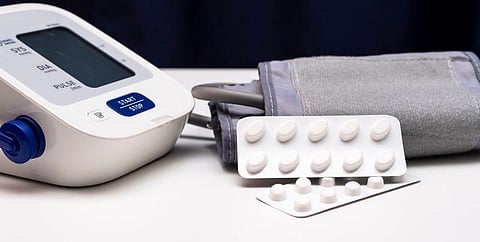Hypertension, also known as high blood pressure, is the most common cardiovascular risk factor. It describes a condition where the force of blood pushing against the walls of blood vessels called arteries is too high.
High pressures in arteries can lead to damage and subsequent health consequences. Uncontrolled hypertension has been shown to cause significant health conditions, such as:
However, the good news is that preventive treatment options exist to control and manage blood pressure.
Medication management
Blood pressure medications, or antihypertensives, bring blood pressure down to healthier levels. Clinical trials, like those done at Northwestern Medicine Central DuPage Hospital, have shown that by treating high blood pressure, antihypertensive medications prevent heart attacks, stroke, heart failure and kidney failure.
Antihypertensives are very common. In the United States, about 50% of people aged 20 and older, or about 115 million adults, have high blood pressure. Many are advised to take antihypertensives to help achieve blood pressure control.
There are several types of blood pressure medications, each working in different ways to control hypertension. Healthcare providers use these medicines alone or in combination to regulate high blood pressure and reduce the risk of health complications.
Here are some common types of blood pressure medications and how they work.
Thiazide diuretics
These medications work in the kidney to help the body eliminate extra sodium and water. This reduces the volume of blood inside the blood vessels, thereby reducing pressure. Diuretics are often prescribed as a first-line treatment for hypertension.
Common types of thiazide diuretics include:
Hydrochlorothiazide
Chlorthalidone
Indapamide
Angiotensin-converting enzyme (ACE) inhibitors
ACE inhibitors block the formation of a natural chemical that narrows blood vessels. These medications relax blood vessel walls, making it easier for blood to flow through them and resulting in lower pressures within the blood vessels. ACE inhibitors have also been shown to protect and improve heart pumping function in patients with heart failure. They have also been shown to protect kidney function, particularly in patients with diabetes.
Common types of ACE inhibitors include:
Lisinopril
Benazepril
Enalapril
Angiotensin II receptor blockers (ARBs)
ARBs are similar to ACE inhibitors. They block the action of a hormone called angiotensin II, which results in relaxation of blood vessels and blood pressure reduction. Like ACE inhibitors, ARBs also have beneficial effects in patients with heart failure and chronic kidney disease.
Common types of ARBs include:
Losartan
Valsartan
Candesartan
Irbesartan
Calcium channel blockers
Calcium channel blockers prevent calcium from entering the cells of heart and blood vessel walls. By doing this, calcium channel blockers relax the muscles of the blood vessels and widen blood vessels, resulting in lower pressures inside the blood vessel. Some calcium channel blockers also slow down heart rate.
Common types of calcium channel blockers include:
Amlodipine
Diltiazem
Verapamil
Beta-blockers
Beta-blockers block signals in the heart to slow down the heart rate and reduce the force of the heart’s squeezing effect. This can reduce blood pressure. Beta-blockers may also be used to manage certain heart conditions, like coronary disease or heart failure.
Common types of beta blockers include:
Metoprolol
Carvedilol
Propranolol
It’s important to follow your healthcare provider’s instructions when taking blood pressure medications. Healthcare providers may try one antihypertensive agent and gradually add a second or third medication to help bring blood pressure under control.
Although generally very safe and effective, it’s important to be aware of side effects and other effects of blood pressure medications. Common side effects may include:
Dizziness
Fatigue
Increased urination
Headaches
Cough
Communicate any concerns about these medications to your healthcare provider, so that your treatment plan can be adjusted.
Lifestyle updates to help manage blood pressure
Medications are just one facet of a blood pressure control strategy. Adopting a heart-healthy lifestyle complements the effects of medicines to promote blood pressure control. Eating a heart-healthy diet that’s low in sodium and high in fruits and vegetables, like a Dietary Approaches to Stop Hypertension (DASH) diet or Mediterranean diet, has been shown to reduce blood pressure.
Other healthy lifestyle changes include:
In summary, blood pressure medications play a vital role in managing hypertension and reducing the risk of associated health problems. Understanding how these medications work, following your healthcare provider’s recommendations and complementing medicines with healthy lifestyle choices may significantly improve cardiovascular health and well-being.


